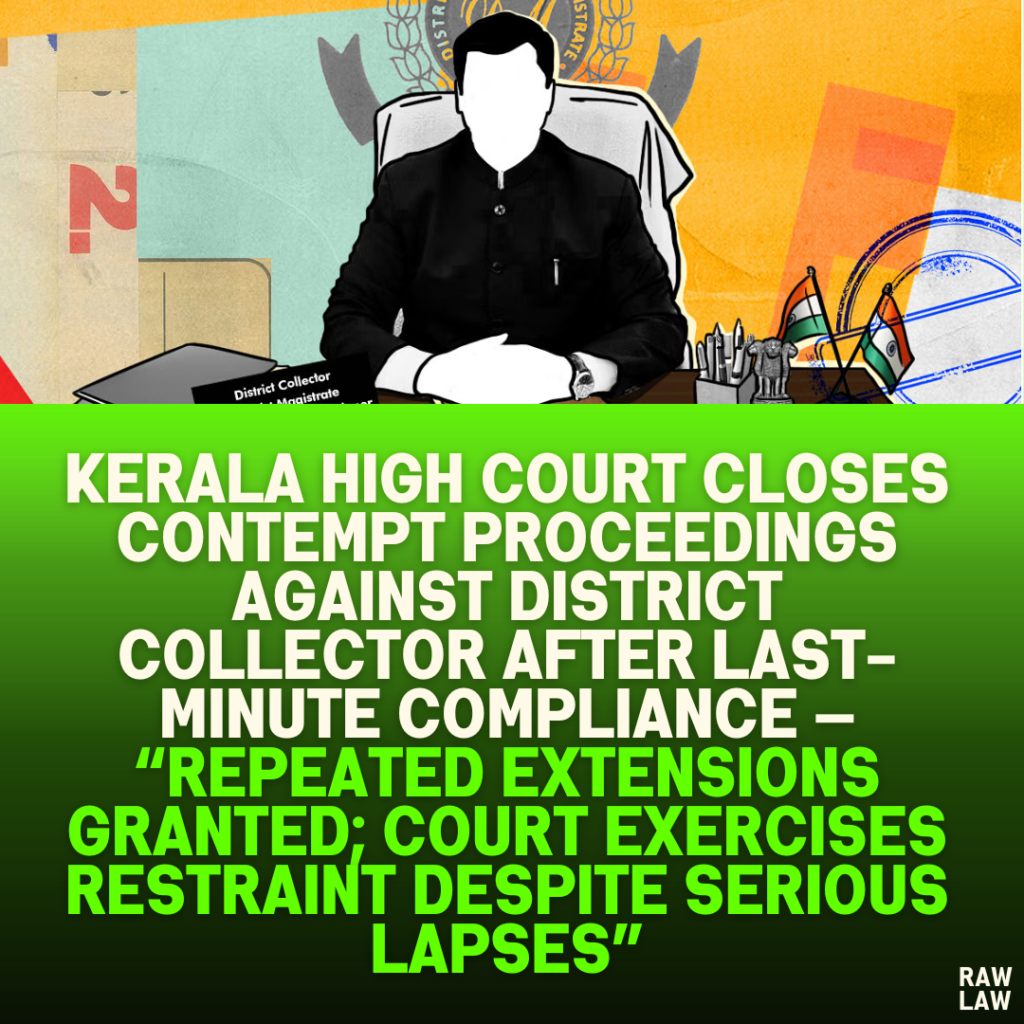Court’s Decision
The Kerala High Court closed a batch of contempt petitions against the District Collector, Ernakulam, after noting compliance with its earlier judgments. However, the Court sternly recorded that the respondent’s conduct was “far from satisfactory,” emphasizing that repeated extensions were granted, and the final compliance came only on the date of hearing. Justice C. Jayachandran observed:
“Despite the serious laches, this Court would remind itself that exercise of restraint of the power, albeit its availability in abundance, would only add to the majesty of the Court.”
Facts
Several petitioners had previously approached the High Court through individual writ petitions seeking directions against the District Collector. These writ petitions culminated in a batch of judgments dated 13.11.2023, which directed the Collector to act within two months. Despite extensions granted by the Court upon requests, the Collector failed to comply with the directions even during the extended timeline.
As a result, the petitioners initiated contempt proceedings in January 2025. The cases were listed for hearing on 30 May 2025.
Issues
- Whether the District Collector complied with the final directions issued in the writ petitions dated 13.11.2023.
- Whether the delay in compliance amounted to willful disobedience warranting action under the Contempt of Courts Act, 1971.
Petitioner’s Arguments
- The petitioners submitted that the District Collector failed to comply with the Court’s directions even after multiple opportunities and extensions, demonstrating willful and deliberate disobedience.
- They contended that such defiance undermines the authority of the Court and violates the principles of rule of law.
Respondent’s Arguments
- The learned Government Pleader appearing for the District Collector submitted that the requisite orders had finally been passed on the same day (30.05.2025) and placed a copy before the Court.
- It was further submitted that the orders had also been served upon the counsel for the petitioners, evidencing compliance.
Analysis of the Law
The Court reiterated the fundamental principle that contempt jurisdiction is to be invoked with caution and restraint. It acknowledged that while non-compliance had occurred, the contemnor had ultimately complied before the matter was adjudicated on merits. The Court recognized its power under the Contempt of Courts Act, 1971, but emphasized that exercise of such power must be judicious and tempered with a spirit of fairness.
Precedent Analysis
Though no specific judicial precedents were cited in the judgment, the Court’s reasoning echoed settled principles from prior rulings of the Supreme Court regarding the exercise of contempt powers with restraint when compliance has eventually been secured, albeit late.
Court’s Reasoning
The Court noted:
“The direction was to comply with the judgment within two months… Extension was sought for twice and quite magnanimously, this Court has granted it. Even during the extended period, there was no compliance, which compelled the petitioners to move this Court.”
Further, the Court remarked on the indifferent attitude of the respondent:
“It appears that the said attempt [contempt filing] was also taken lightly by the respondent… The respondent could condescend to comply the judgment only today.”
Nonetheless, the Court concluded that:
“Exercise of self-restraint and closure of the contempt petitions, once compliance is shown, would be the proper course to uphold the majesty of the Court.”
Conclusion
The Court accepted the Government’s submission that compliance had finally been effected and accordingly closed all the contempt cases. However, it expressly recorded displeasure at the delayed compliance and cautioned the respondent regarding future conduct. It directed that the judgment be immediately communicated to the respondent.
Implications
- The judgment reaffirms the High Court’s readiness to exercise contempt jurisdiction while emphasizing judicial restraint.
- It sends a strong message to government officials regarding timely compliance with court orders.
- It also underscores the principle that delayed obedience, though unsatisfactory, may avert penal consequences if ultimately fulfilled.



